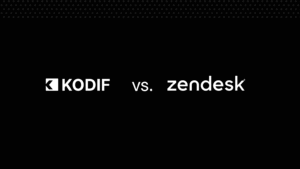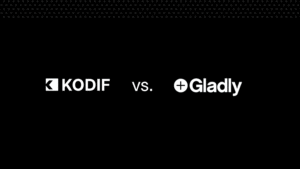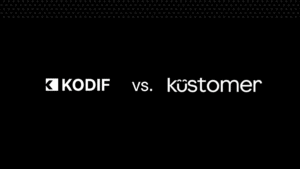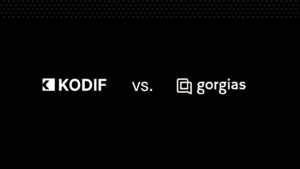When evaluating Siena alternatives for AI-powered customer support, ecommerce brands face a critical choice that impacts customer satisfaction, operational costs, and revenue growth. Modern AI-powered platforms deliver autonomous resolution across all support channels while executing real actions like processing refunds, managing subscriptions, and handling returns. This guide examines the top alternatives for DTC brands, subscription businesses, and mid-market ecommerce companies, with focus on how platforms transform customer service from a cost center into a revenue driver through ecommerce-native automation.
Key Takeaways
- KODIF emerges as a leading alternative with ecommerce-native AI automation delivering rapid implementation, policy-driven workflows, and results like Dollar Shave Club’s 6x containment growth and Just Food For Dogs’ 62% inquiry resolution by AI
- Agentic AI platforms autonomously execute complete workflows including refunds, exchanges, and subscription modifications without human intervention
- According to vendor case studies, some platforms report 70-89% automation rates while maintaining high CSAT scores
- Ecommerce-specialized platforms deliver faster time-to-value through pre-built integrations with Shopify, Recharge, Loop Returns, and subscription management systems
- Resolution-first approaches that solve customer problems outperform deflection-focused strategies, particularly for retention-critical subscription businesses
1. KODIF: Ecommerce-Native AI Platform Built for Resolution
KODIF represents the next evolution in ecommerce customer support automation, combining AI-powered autonomous resolution with deep platform integrations and policy-driven workflows that CX teams control without engineering resources. Unlike generalist chatbot platforms, KODIF covers the full customer journey from pre-purchase cart recovery through post-purchase returns and subscription management.
Why KODIF Stands Out
Ecommerce-Native Architecture:
KODIF built its platform specifically for ecommerce brands rather than adapting generic enterprise software. This specialization delivers over 100 integrations listed on KODIF’s integrations directory with Shopify, Recharge, Skio, OrderGroove, Loop Returns, AfterShip, Klaviyo, and major helpdesks (Gorgias, Zendesk, Kustomer, Gladly, Freshdesk, Intercom) that enable real actions—not just information retrieval—such as issuing refunds, generating return labels, modifying subscriptions, and applying discounts.
Resolution Rates:
According to KODIF case studies, the platform reports autonomous resolution (tickets fully resolved without human intervention) of 76-92% depending on ticket type:
- Technical Support: 92%
- Order & Shipping: 88%
- Product & Service Information: 82%
- Account Management: 76%
Implementation Speed:
KODIF deploys in weeks rather than the extended timelines some enterprise competitors require. The no-code platform allows CX teams to own automation without engineering dependencies, with white-glove onboarding including dedicated AI engineers who observe current workflows and create custom implementation plans.
Proven Results
- 6x growth in containment rate (preventing ticket escalation to human agents)
- 3x increase in AI agent ticket coverage
- Targeting 70% containment rate
- Handles tier 2 tickets and omnichannel support
- 62% of inquiries resolved by AI
- 66% positive sentiment on dietary and product topics
- 11-message average showing depth of AI conversations
- Handles feeding guidelines, thawed orders, subscriptions, and dietary questions
- 40% reduction in Average Handle Time
- AI Copilot implementation for agent productivity
- Maintained service quality during scaling
Pricing and ROI
KODIF offers tiered pricing with automation-weighted models and provides ROI estimates based on ticket volume and automation assumptions. The platform offers a 30-day free trial to validate automation rates before committing.
2. Yuma AI: Shopify-Focused Automation
Yuma AI targets Shopify merchants specifically, offering streamlined integration with the Shopify ecosystem and competitive pricing for small-to-medium businesses.
Key Features
- Shopify-native integration for rapid setup
- AI-powered draft generation within helpdesk systems
- Agent assist model rather than full autonomous resolution
- According to vendor reports, some customers achieve 40% automation within days
When Yuma Makes Sense
Shopify merchants seeking basic automation to support human agents find value in Yuma’s approach. Best for brands with straightforward support needs that don’t require complex workflow automation beyond Shopify.
3. Gorgias: Helpdesk Platform with Built-In AI
Gorgias operates as an ecommerce-focused helpdesk platform that includes AI automation capabilities, positioning itself as an all-in-one solution.
Capabilities
- Unified helpdesk for email, chat, SMS, social media, voice
- Ecommerce platform integrations with Shopify and BigCommerce
- Macro automation for common response patterns
- Revenue attribution tracking for support-driven sales
Consideration
Gorgias requires brands to replace their existing helpdesk rather than augmenting current systems, creating migration friction for established teams with historical data in platforms like Zendesk or Kustomer.
4. Ada: Enterprise Conversational AI
Ada serves enterprise organizations across industries with conversational AI that handles customer inquiries through chat, email, and messaging channels.
Enterprise Focus
- Multi-industry platform serving retail, fintech, healthcare, telecom
- Conversational AI across digital channels
- Analytics and reporting dashboards
- Enterprise security and compliance certifications
Limitation
Ada’s broad industry focus means the platform lacks ecommerce-specific features like subscription management, return label generation, and order modification capabilities that commerce-specialized alternatives provide natively.
5. Zendesk AI: Enterprise Support Platform
Zendesk offers AI capabilities as part of its comprehensive customer service platform, adding automation to established ticketing, knowledge base, and support tools.
AI Features
- Answer Bot for FAQ automation using knowledge base
- Intent detection and ticket routing
- Sentiment analysis and CSAT prediction
- Agent workspace with AI-powered suggestions
Consideration
Zendesk’s extensive feature set creates complexity that may overwhelm teams seeking focused AI automation for ecommerce support. Executing actions like processing refunds or modifying subscriptions typically requires custom development rather than pre-built workflows.
6. Intercom: Live Chat and AI Combined
Intercom combines live chat functionality with AI automation, positioning as a customer communication platform spanning marketing, sales, and support.
Hybrid Model
- Live chat with human agent handoff
- AI chatbot builder with conversation flows
- Product tours and in-app messaging
- Email and messaging channel support
Trade-off
Intercom’s broad scope across marketing, sales, and support means no single function reaches the depth of specialized alternatives. Ecommerce teams seeking advanced support automation find gaps in commerce-specific workflows.
7. Kustomer: Customer Timeline Approach
Kustomer emphasizes a timeline-based view of customer interactions, organizing all touchpoints chronologically rather than by individual tickets.
Features
- Customer timeline showing all interactions and history
- Omnichannel conversation management
- Workflow automation and routing rules
- AI-powered chatbots and suggestions
Note: Kustomer’s timeline approach requires teams to shift from ticket-based to customer-based thinking, creating change management challenges during adoption.
8. Freshdesk with Freddy AI
Freshdesk provides budget-friendly helpdesk software with Freddy AI adding automation capabilities for ticket routing, response suggestions, and chatbot interactions.
Offering
- Affordable pricing for small-to-medium businesses
- Multi-channel ticketing across email, phone, chat, social
- Freddy AI for ticket categorization and chatbot
- Knowledge base and self-service portal
Limitation
While Freshdesk’s pricing appeals to cost-conscious teams, the platform’s AI capabilities lag behind specialized alternatives in automation depth and ecommerce integration breadth.
The Agentic AI Difference
The customer service market is shifting from rule-based chatbots that follow scripts to autonomous AI agents capable of multi-step task execution. Agentic platforms reason through complex scenarios, make decisions based on business rules, execute actions across multiple systems, and complete entire workflows autonomously—contrasting with traditional chatbots that answer FAQs but escalate any request requiring system action.
Resolution Examples
According to vendor case studies, some platforms report impressive automation rates:
- EvryJewels: 89% full automation with 63% cost-per-ticket reduction
- Clove: 70% full automation within 3 months with 3x ROI
- Simple Modern: 79% ticket automation with 98% CSAT
Implementation Speed Matters
Time-to-value varies dramatically across platforms. Some implementations complete in days to weeks, while enterprise platforms may require extended timelines depending on platform architecture, integration depth, and configuration complexity.
Rapid Deployment Examples:
- Some Shopify-focused platforms report achieving meaningful automation within days
KODIF’s White-Glove Onboarding:
KODIF assigns dedicated AI engineers who observe current agent workflows, create custom implementation plans, and provide comprehensive setup support—delivering deployment in weeks while maintaining automation depth. The no-code platform enables CX teams to own configuration without waiting for engineering resource.
The KODIF Platform
AI Agent – Autonomous Resolution:
Operates across chat, email, SMS, social media, and voice channels with policy-driven automation that executes complete workflows. Natural language policy creation allows CX teams to define rules without code—example: “If a customer requests a subscription skip and has an active subscription, skip the next delivery and confirm.”
AI Copilot – Agent Empowerment:
Provides human agents with contextual customer information, AI-generated response drafts, suggested next actions with one-click execution, and real-time policy guidance. This reduces Average Handle Time while maintaining quality.
AI Analyst – Insights Engine:
Automatically detects topics, tracks sentiment trends, provides real-time alerts for volume spikes or sentiment shifts, and identifies knowledge gaps requiring new help center articles.
AI Manager – Workflow Optimization:
Continuously tests and refines automation policies, conducting A/B experiments on different approaches and identifying opportunities to expand automation coverage.
Ecommerce Integration Depth
KODIF’s integrations enable complete workflow automation:
- Subscription Management: Skipping deliveries, pausing subscriptions, swapping products, updating billing through Recharge, Skio, OrderGroove
- Returns Processing: Generating return labels, initiating refunds, processing exchanges via Loop Returns, Returnly
- Order Modifications: Changing addresses, applying discounts, canceling orders through Shopify and commerce platform APIs
- Shipping Operations: Tracking packages, managing carrier issues via AfterShip, ShipStation
Frequently Asked Questions
What’s the difference between Siena and KODIF for ecommerce customer support?
Siena operates as an agentic AI platform with multi-step workflow capabilities.
KODIF delivers ecommerce-native automation with rapid deployment, achieving reported resolution rates of 76-92% across ticket types through over 100 pre-built integrations and policy-driven workflows that CX teams control without engineering resources.
According to case studies, KODIF has delivered results like Dollar Shave Club’s 6x containment growth.
How long does it take to implement an AI customer support platform?
Implementation timelines vary significantly depending on platform architecture and integration depth. Some streamlined platforms demonstrate meaningful automation within days to weeks, while enterprise solutions may require extended timelines.
KODIF deploys in weeks through white-glove onboarding with dedicated AI engineers who observe workflows and create custom implementation plans.
What resolution rate should I expect from AI-powered helpdesk software?
According to vendor case studies, leading platforms report 70-89% automation rates.
KODIF reports 76-92% autonomous resolution (complete workflow resolution without human intervention) depending on ticket category, with Technical Support at 92%, Order & Shipping at 88%, and Product Information at 82%.
These metrics reflect complete workflow resolution rather than simple deflection.
Do I need engineering resources to set up customer service automation?
Platform requirements vary significantly.
KODIF’s no-code platform enables CX teams to create policies using natural language without engineering dependencies. Some enterprise platforms require custom integration development and technical configuration.
What integrations are essential for ecommerce customer support software?
Essential integrations include ecommerce platforms (Shopify, BigCommerce), subscription management (Recharge, Skio, OrderGroove), returns processing (Loop Returns), shipping operations (AfterShip, ShipStation), helpdesks (Gorgias, Zendesk, Kustomer, Gladly), and CRM systems.
KODIF offers over 100 pre-built connectors enabling real actions like issuing refunds, generating return labels, and modifying subscriptions rather than just information retrieval.
How do AI Copilot and AI Agent approaches differ?
AI Copilot provides human agents with contextual information, response drafts, and suggested actions while agents maintain final control over customer communication.
AI Agent operates autonomously, executing complete workflows including refunds, subscription modifications, and order changes without human intervention.
KODIF offers both AI Agent for autonomous resolution and AI Copilot for agent assistance, with Good Eggs achieving 40% Average Handle Time reduction through the Copilot approach.









